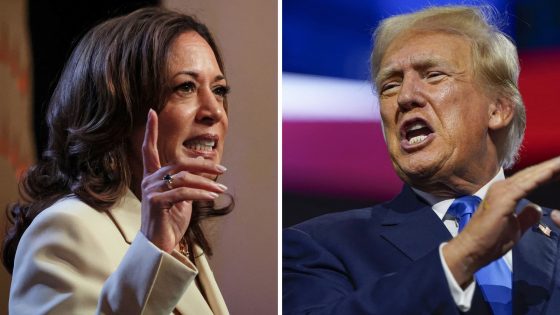Republican presidential nominee Donald Trump on Monday blamed Vice President Kamala Harris for the stock market’s dramatic plunge, months after claiming he deserved credit for the market’s then-record upswing.
“Of course there is a massive market downturn. Kamala is even worse than Crooked Joe,” Trump wrote in a post on Truth Social about Harris, the de facto Democratic presidential nominee.
The night before, as Asian markets fell dramatically, the former president wrote, “STOCK MARKETS CRASHING. I TOLD YOU SO!!! KAMALA DOESN’T HAVE A CLUE. BIDEN IS SOUND ASLEEP. ALL CAUSED BY INEPT U.S. LEADERSHIP!”
U.S. stocks dropped sharply Monday, apparently in reaction to fears of a recession that were sparked in part because of Friday’s weaker-than-expected jobs report.
But in January, when the Dow Jones Industrial Average and S&P 500 reached record highs, Trump said the surge was because investors thought he would beat President Joe Biden.
“THIS IS THE TRUMP STOCK MARKET BECAUSE MY POLLS AGAINST BIDEN ARE SO GOOD THAT INVESTORS ARE PROJECTING THAT I WILL WIN,” he wrote on Truth Social that month.
The Harris campaign pushed back on Monday with its own attack against Trump’s economic record.
“Donald Trump had the worst jobs record of any modern president, and oversaw some of the worst days in the stock market in history while spending his presidency lining the pockets of his wealthy friends who shipped American jobs overseas,” Harris campaign spokesperson Ammar Moussa said in a statement. “What middle class families need is steady economic stewardship, not chaotic ranting lies.”
Trump’s comments reflect the political risk of tying a campaign to the ever-changing behavior of the markets, Moody’s chief economist Mark Zandi told CNBC.
“Throughout history, I think politicians have avoided trying to peg their fortunes to the stock market as a signal of their policies or anything because the market goes up and down all around,” Zandi said.
“Former President Trump is the first to do that,” Zandi added. “I’m confused by it.”
When Trump was president in March 2020, the S&P 500 experienced several steep drops, including a 12% plunge on March 16, 2020, as fears about the spread of the Covid-19 pandemic in the United States grew. That was one of the worst drops in S&P history.
The former president has lost his polling lead since Biden dropped out of the election in July and endorsed Harris to be the Democratic nominee.
A CBS News/YouGov poll released Sunday found Harris one percentage point ahead of Trump with likely voters in a head-to-head matchup, a lead that is within the survey’s margin of error. The poll surveyed 3,102 registered voters from Tuesday through Friday.
As Harris rides that early groundswell of support, Trump is working to tie her candidacy to Biden’s record, which some voters blame for their high costs of living.
Trump, as a result, tried to spin Monday’s market wreck and the consequent recessionary panic into a broader case against Harris’ economic record.
But Zandi said the markets are in correction territory and that Monday’s dip is not necessarily reflective of the broader economic downturn that Trump described on social media.
“The stock market, based on my experience, could end up green by the end of the day,” Zandi said, noting that the market is still up for the year.
“So I’d say, what downturn?”
The Harris campaign, when asked for comment on Trump’s posts, pointed to a campaign speech the vice president gave last week in Atlanta.
Trump “intends to give tax breaks to billionaires and big corporations. He intends to gut our investments in clean energy jobs. He intends to end the Affordable Care Act,” Harris said in that speech.
“To take us back to a time when insurance companies had the power to deny people with preexisting conditions,” the vice president said.
“Do you guys remember what that was? Children with asthma. Breast cancer survivors. Grandparents with diabetes. Georgia, America has tried these failed policies before, and we are not going back. We’re not going back. We’re not going back.”
â Additional reporting by CNBC’s Kevin Breuninger.
Source Agencies




